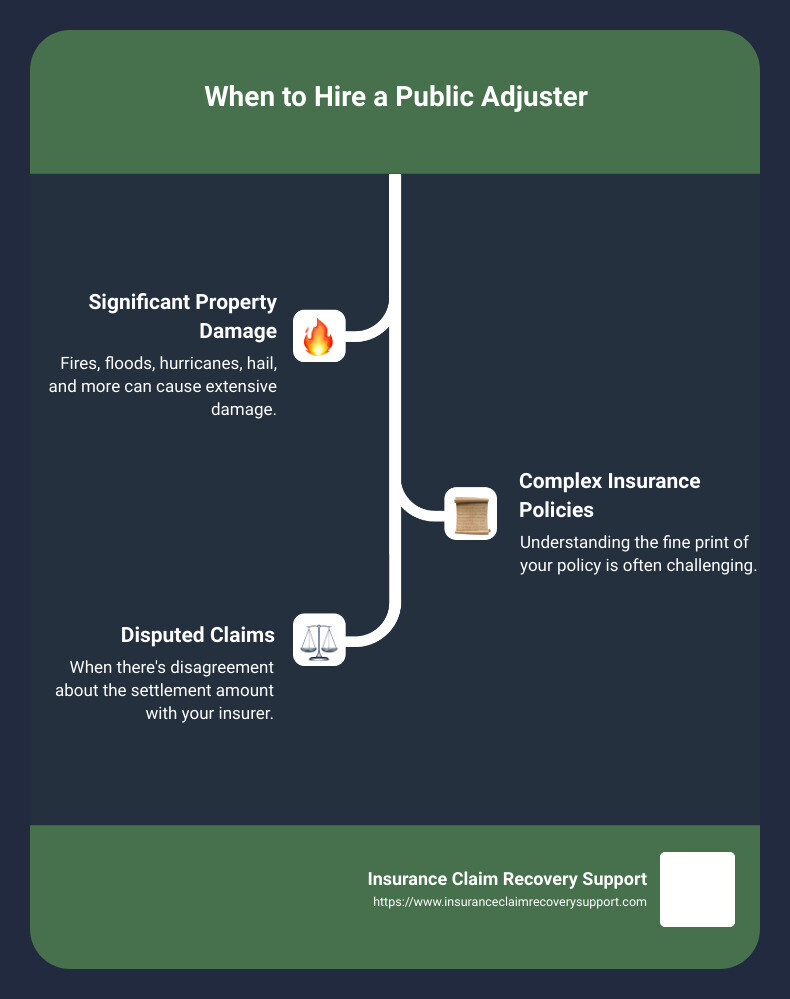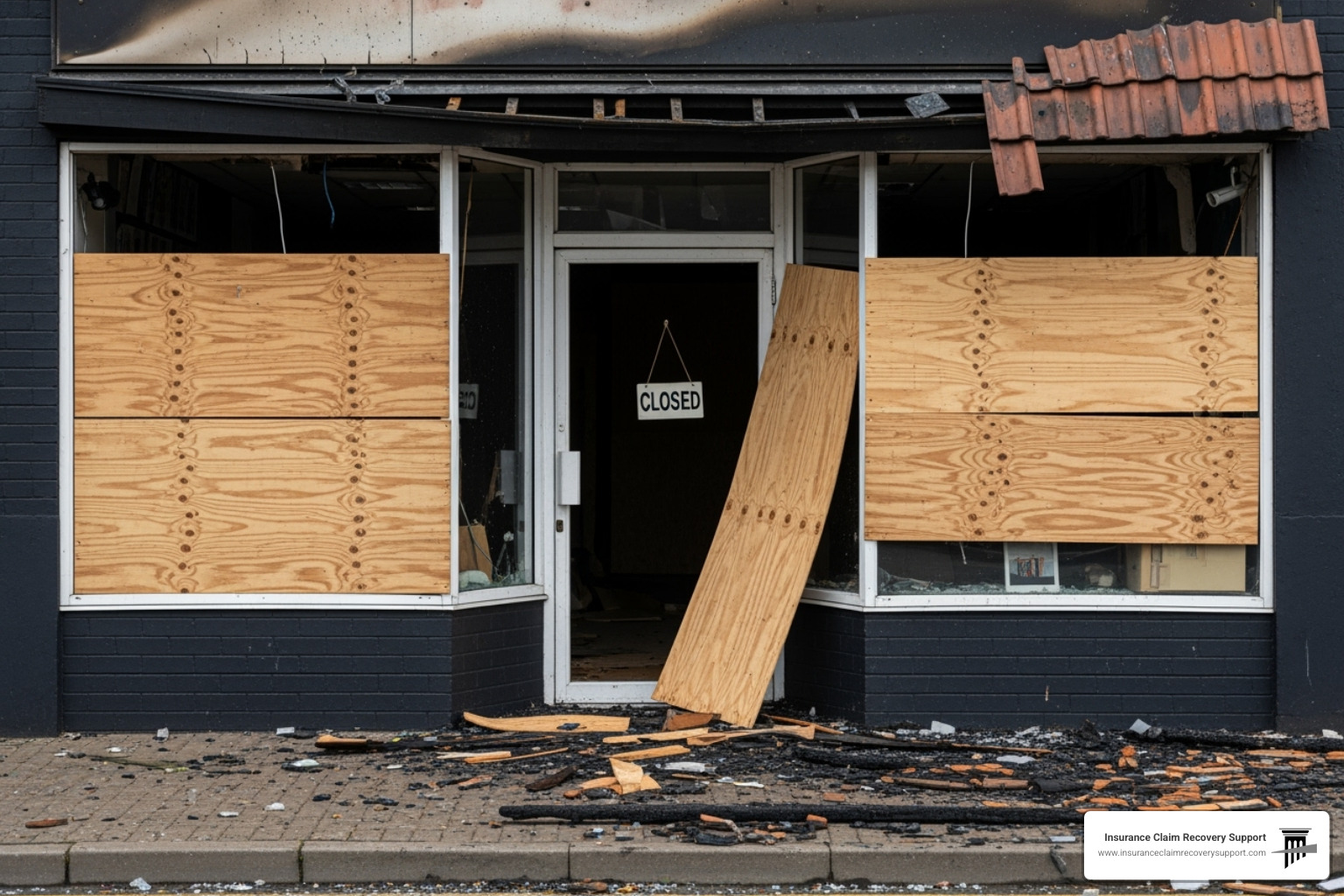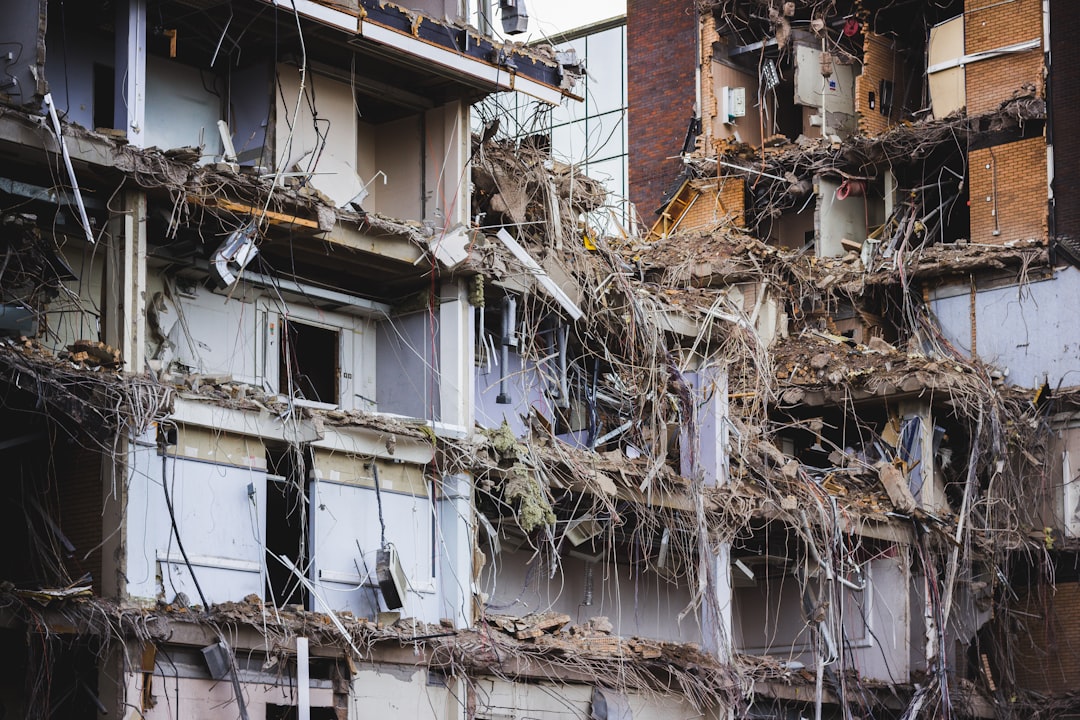Public adjuster needed in your search query likely means you’re curious about whether a professional can help with your insurance claim. Public adjusters can make the complex insurance claim process smoother by ensuring you get what you deserve. Here’s when you might need one:
- Significant property damage: Fires, floods, hurricanes, hail, and more.
- Complex insurance policies: Understanding fine print isn’t easy.
- Disputed claims: When there’s disagreement about the settlement.
Navigating property damage and insurance claims can be overwhelming for policyholders, especially when disasters like fire, floods, or hurricanes occur. It’s at this point that you might wonder if a public adjuster is necessary. Public adjusters are licensed professionals who help ensure you receive a fair settlement by representing your best interests—not the insurance company’s.
Key reasons to consider a public adjuster:
1. Complex processes: They simplify the insurance jargon and requirements.
2. Maximized settlements: They’re skilled at negotiating higher payouts.
3. Time-saving: They handle the claim, so you don’t have to.
I’m Scott Friedson, a multi-state licensed public adjuster. Over the years, I’ve helped policyholders settle hundreds of large loss claims, ensuring they receive the compensation they deserve. My experience in this field has shown that engaging a public adjuster can significantly streamline the claims process.

Understanding the Role of a Public Adjuster
When dealing with an insurance claim, understanding the role of a public adjuster can make a huge difference. Let’s break down what they do and why they might be necessary for your claim.
Claim Negotiation
Public adjusters are experts in claim negotiation. Their job is to ensure you get the highest possible settlement from your insurance company. Insurance companies often offer quick settlements that are lower than what you’re entitled to. A public adjuster will spot any potential damage that might be missed by the insurance company’s adjuster. They use their expertise to argue for a higher payout.
For example, after a hurricane, they can help determine how much of the water damage was due to rain coming in through a roof damaged by wind versus flooding. This distinction can be crucial in maximizing your claim.
Policy Interpretation
Insurance policies are full of legal jargon and complex terms. Public adjusters are fluent in this language. They help you interpret your policy, ensuring you understand your coverage. This is especially helpful when dealing with multiple policies, like homeowners, windstorm, and flood insurance after a disaster.
Many people find insurance contracts confusing and are unsure of their coverage. Turning to your insurance agent for clarifications can sometimes help, but if you still don’t understand your policy, a public adjuster can review your loss with no obligation.
Case Study: Hurricane Damage
After Hurricane Michael, many homeowners in Florida were confused about their insurance coverage. One policyholder, Jane, faced extensive roof damage and water intrusion. The insurance company offered her a quick settlement that seemed too low. Jane hired a public adjuster, who found additional structural damage and valued her loss properly. In the end, Jane received a much higher payout than the initial offer.
Real-Life Example
Scott Friedson, a multi-state licensed public adjuster, shared an experience where he helped a family whose home was severely damaged by a fire. The insurance company initially offered a settlement that barely covered the cost of rebuilding. Scott’s team identified hidden damages and used the same estimating software as the insurance carrier. They negotiated a settlement that fully covered the rebuilding costs and additional living expenses.
Why It Matters
In many cases, the expertise of a public adjuster can be the difference between a low settlement and receiving the full amount you’re entitled to. They handle the complexities of your insurance policy, negotiate on your behalf, and ensure that all damages are accounted for.

Understanding the role of a public adjuster can significantly impact your claims process, especially in complex situations. They advocate for you, manage the intricacies of your policy, and work to maximize your settlement. This expertise can be invaluable, particularly after a disaster.
Next, let’s dive into the advantages of hiring a public adjuster and how they can help you achieve higher settlements and save time.
Advantages of Hiring a Public Adjuster
When disaster strikes, navigating the insurance claim process can feel like an uphill battle. This is where hiring a public adjuster can make a world of difference. Here are three key advantages of enlisting their help:
Higher Settlements
Public adjusters are experts at thoroughly assessing damage and ensuring no detail is overlooked. Statistics show that claims handled by public adjusters often result in higher settlements than those managed without one.
Why? Insurance companies aim to settle claims for as little as possible. A public adjuster knows how to counter this. They use their expertise to accurately document and value your losses, ensuring you get what you’re rightfully owed.
“Insurance companies have experts working for them. You should, too!” — Scott Friedson, Insurance Claim Recovery Support
Expertise
Insurance policies are dense and filled with complex terminology. Understanding these documents can be overwhelming. Public adjusters, however, are trained to steer these intricacies.
Expertise in Action:
– Detailed Assessment of Damage: They can spot hidden issues that might be missed, such as mold after water damage.
– Policy Interpretation: They accurately interpret the language of your policy and argue for a fair settlement on your behalf.
– Negotiation Skills: They handle negotiations with the insurance company, ensuring all your losses are accounted for.
Public adjusters bring a wealth of experience, often having worked for insurance companies themselves. This insider knowledge helps them identify and leverage loopholes to your advantage.
Time-Saving
Filing an insurance claim is not only complex but also time-consuming. It involves documenting damage, gathering evidence, and negotiating with insurance companies. All this while you’re dealing with the aftermath of a disaster.
Benefits of Time-Saving:
– Stress Reduction: Public adjusters take on the burden of the claims process, allowing you to focus on rebuilding and recovery.
– Efficiency: They ensure that your claim is handled efficiently and professionally, speeding up the process.
– Peace of Mind: Knowing that an expert is managing your claim can provide significant peace of mind.
Most people who use an experienced public adjuster report that the time saved, stress removed, and peace of mind provided is well worth the fee.
Hiring a public adjuster can be a game-changer in your insurance claim process. Next, let’s look at the specific requirements to become a public adjuster in key states like Florida and Pennsylvania.
Requirements to Become a Public Adjuster in Key States
Florida Public Adjuster Requirements
To become a public adjuster in Florida, there are several key steps you must take:
- Complete an Insurance Course: Aspiring public adjusters must first complete a state-approved insurance course. This course covers essential topics like policy interpretation, claims negotiation, and regulatory compliance.
- Pass the State Exam: After completing the course, you must pass the Florida state exam for public adjusters. This exam tests your knowledge of insurance policies, state laws, and ethical practices.
- Obtain a $50,000 Bond: Florida requires public adjusters to secure a $50,000 surety bond. This bond protects policyholders from potential misconduct or errors by the adjuster.
These steps ensure that Florida public adjusters are well-prepared and accountable, providing reliable support to policyholders.
Pennsylvania Public Adjuster Requirements
Pennsylvania has its own set of requirements for public adjusters:
- Series 16-19 Examination: In Pennsylvania, you must pass the Series 16-19 examination. This exam assesses your understanding of insurance policies, claims processes, and state regulations.
- No Pre-Licensing Education: Unlike Florida, Pennsylvania does not require any pre-licensing education. However, it’s still crucial to study and understand the material thoroughly to pass the exam.
These requirements are designed to ensure that Pennsylvania public adjusters are knowledgeable and capable of handling insurance claims effectively.
Understanding the requirements to become a public adjuster in key states like Florida and Pennsylvania highlights the rigorous process these professionals undergo to serve policyholders. Next, we’ll explore when you should consider hiring a public adjuster for your claim.
When to Consider Hiring a Public Adjuster
Evaluating Your Claim
When evaluating whether a public adjuster is needed, start by assessing the extent of your damage and your understanding of your insurance policy. If your property has suffered significant damage, such as from a hurricane, flood, or fire, the claims process can become overwhelming. In these cases, a public adjuster can ensure all damages are accounted for, including hidden structural issues and possessions that might be overlooked by the insurance company’s adjuster.
Damage assessment is crucial. Take the time to document everything. This includes taking photographs and videos of the damage, and keeping receipts for emergency repairs and temporary housing. A public adjuster can help you prepare a thorough Scope of Loss and estimate the cost of repair or replacement accurately.
Insurance policy review is another critical step. Insurance policies can be complex and filled with fine print. A public adjuster is well-versed in policy language and can help you understand the extent of your coverage, ensuring you claim all the benefits you are entitled to.
The Complexity of Your Claim
Some claims are inherently complex. For example, if your home is damaged in a way that affects multiple areas or systems, a public adjuster can help. They will thoroughly document all damages and ensure nothing is overlooked. This expertise is especially valuable when dealing with large claims involving multiple types of damage, such as structural and water damage.
Settlement negotiation can be tricky. Insurance companies sometimes offer quick payoffs to settle claims fast. While this might seem convenient, it can result in you receiving less than you deserve. A public adjuster can negotiate on your behalf to ensure you get a fair settlement.
Disputed claims are another area where a public adjuster can be invaluable. If you find yourself disagreeing with the insurance company’s settlement offer, a public adjuster can reassess the damages and provide a second opinion. This can be crucial if you believe the insurer’s estimate won’t cover all repair costs. For instance, in a case study, Jane’s home was severely damaged by a storm. The insurance company offered her $80,000, but with the help of a public adjuster, she negotiated a settlement of $120,000.
Understanding when to hire a public adjuster can significantly impact the outcome of your claim. Next, we’ll explore the differences between public and independent adjusters to further clarify their roles.
The Difference Between Public and Independent Adjusters
Public Adjusters vs. Independent Adjusters
When dealing with an insurance claim, it’s important to understand the roles of different adjusters. Public adjusters work for you, the policyholder. Independent adjusters, on the other hand, are hired by the insurance company. Here’s how their perspectives and goals differ:
Policyholder vs. Insurance Company
Public Adjusters:
- Advocate for the policyholder: Public adjusters are on your side. They aim to maximize your settlement.
- Objective assessment: They provide an unbiased evaluation of the damage, ensuring all your losses are accounted for.
- Expert negotiation: They use their knowledge of insurance policies and claim processes to argue for a fair payout.
Independent Adjusters:
- Represent the insurance company: Independent adjusters are hired by the insurer to assess the claim.
- Minimize payout: Their goal is often to limit the insurance company’s liability, which can result in lower settlement offers.
- Potential conflict of interest: Since they work for the insurer, their assessments may not always align with the policyholder’s best interests.
Claim Adjustment Perspective
Public Adjusters:
- Detailed documentation: Public adjusters carefully document every aspect of your claim. They ensure that all damages, hidden or obvious, are included.
- Thorough policy review: They understand the fine print of your policy and can identify coverages you might miss.
- Persistent negotiation: They are skilled negotiators who can counter low offers with solid evidence, often resulting in higher settlements.
Independent Adjusters:
- Quick assessments: Independent adjusters may aim to settle claims quickly to minimize costs for the insurance company.
- Standardized evaluations: They might use standard formulas and software to estimate damages, which can sometimes overlook unique aspects of your situation.
- Limited negotiation: Their primary role is to report back to the insurer, which might not involve advocating for a higher payout.
Understanding these differences can help you decide whether hiring a public adjuster is right for your situation. If your claim is complex or involves significant damage, having an advocate on your side can make a big difference.
Next, we’ll address some frequently asked questions about public adjusters to help you make an informed decision.
Frequently Asked Questions about Public Adjusters
Is using a public adjuster a good idea?
Using a public adjuster can be a very good idea in certain situations. Here are some reasons why:
- Complex Claims: If your claim involves extensive damage or is complicated, a public adjuster can help ensure nothing is overlooked. For example, after a hurricane, hidden structural damage might be missed without an expert eye.
- Time and Stress: Filing an insurance claim can be time-consuming and stressful. A public adjuster handles the paperwork and negotiations, allowing you to focus on your life.
- Higher Settlements: Public adjusters often secure higher settlements. According to policyholder experiences, insurance companies may lowball offers. A public adjuster knows how to negotiate for a fair amount.
- Policy Understanding: Insurance policies can be confusing. Public adjusters understand the fine print and can make sure you get all the benefits you’re entitled to.
However, hire a reputable public adjuster. Check for complaints with the Better Business Bureau and ask for references to ensure you’re getting a trustworthy professional.
What does it take to be a public adjuster in Florida?
Becoming a public adjuster in Florida involves several steps:
- Insurance Course: You need to complete an approved insurance course. This will cover the basics of insurance policies and claims.
- State Exam: After the course, you must pass a state licensing exam. This tests your knowledge and readiness to handle claims.
- $50,000 Bond: Florida requires public adjusters to post a $50,000 bond. This bond protects clients in case the adjuster acts unethically or incompetently.
These requirements ensure that public adjusters in Florida are well-prepared to handle claims professionally and ethically.
What do you need to be a public adjuster in PA?
In Pennsylvania, the requirements to become a public adjuster are different:
- Series 16-19 Examination: You must pass the Series 16-19 exam. This exam tests your knowledge of insurance policies, claims processes, and state regulations.
- No Pre-Licensing Education: Unlike Florida, Pennsylvania does not require pre-licensing education. However, many choose to take courses to better prepare for the exam.
Understanding these requirements can help you decide if hiring a public adjuster is right for your situation. If your claim is complex or involves significant damage, having an advocate on your side can make a big difference.
Conclusion
Maximizing your insurance settlement can be a daunting task, especially when dealing with complex claims or significant damage. This is where a public adjuster can make a substantial difference.
Insurance Claim Recovery Support LLC specializes in helping policyholders steer the intricate world of insurance claims. Our public adjusters are experts in accurately assessing damage, thoroughly documenting claims, and negotiating assertively with insurance companies to ensure you get the maximum settlement you deserve.
One of the key benefits of hiring a public adjuster from Insurance Claim Recovery Support is the peace of mind we offer. We take the stress off your shoulders, allowing you to focus on restoring your property and life. Our experienced team uses the same estimating software as insurance carriers, understands policy language, and can spot hidden damages that might otherwise be overlooked.
Statistics show that policyholders who hire public adjusters often receive settlements significantly higher than those who handle claims on their own. For example, a case study revealed that a homeowner received a much larger settlement after hiring a public adjuster, who carefully documented all damages and negotiated effectively with the insurance company.
Don’t leave money on the table. Ensure your claim is handled accurately and fairly by partnering with professionals who have your best interests at heart.
Ready to maximize your settlement? Contact Insurance Claim Recovery Support LLC today for a complimentary assessment and let us help you get the settlement you deserve.






